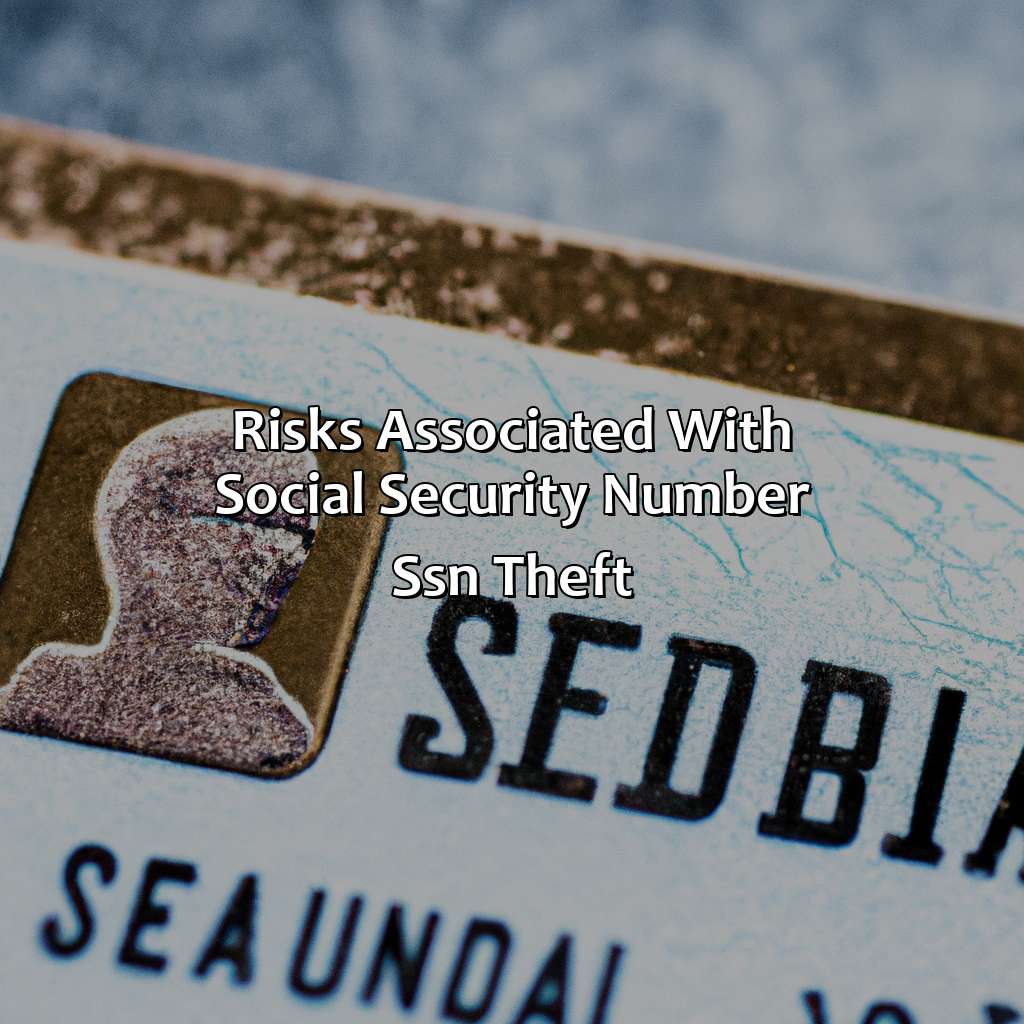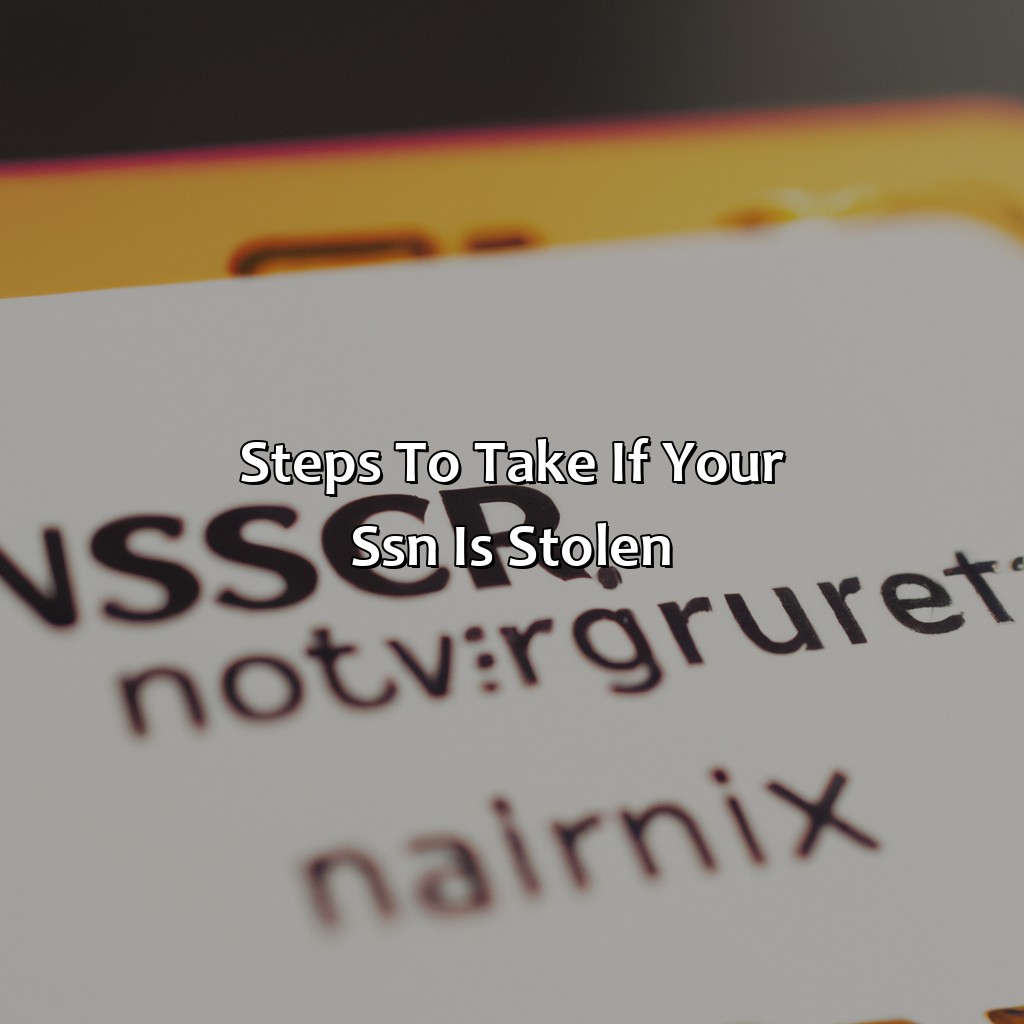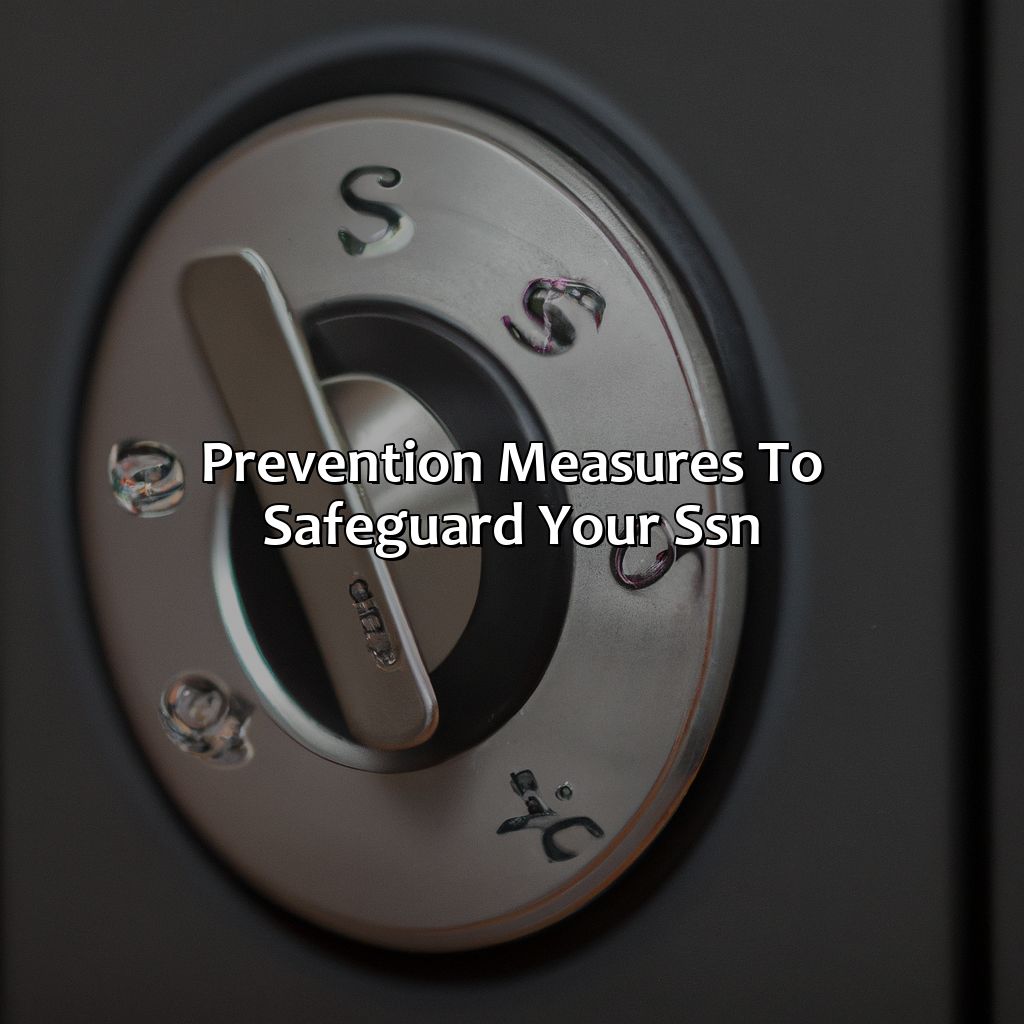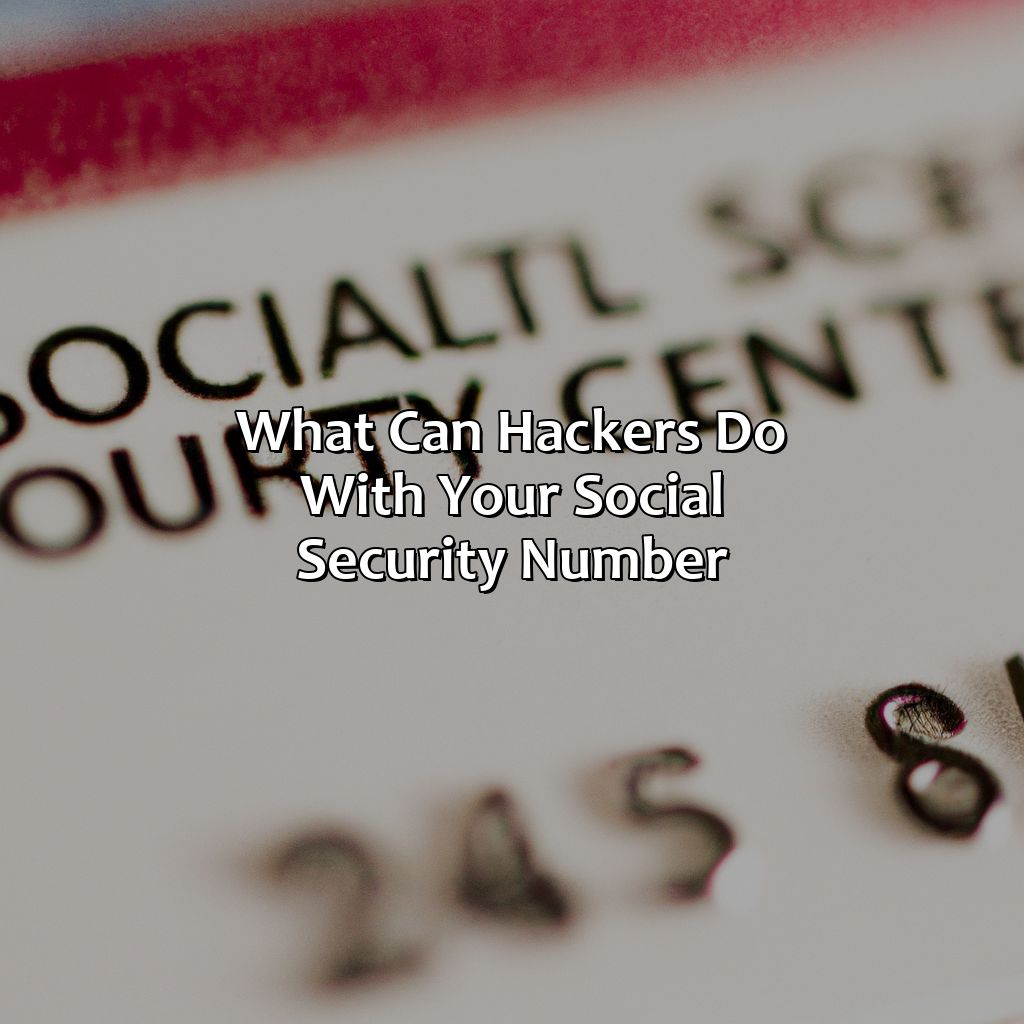What Can Hackers Do With Your Social Security Number?
Key takeaways:
- Hackers can use your Social Security Number (SSN) to commit different types of identity theft, namely financial, medical, and criminal identity theft, which can have severe legal and financial consequences.
- The most common methods used by hackers to steal SSNs are phishing scams, data breaches and social engineering, which rely on tricking or manipulating individuals into revealing their SSN.
- If your SSN is stolen, it is critical to take immediate action by monitoring credit reports, contacting relevant authorities, and freezing your credit to prevent further damage.
- To safeguard your SSN, you can take preventive measures such as securing your personal and financial information, using strong and unique passwords, and enabling two-factor authentication.
- It is essential to stay vigilant against SSN theft, as it poses a significant risk to your financial and personal security.
Are you concerned about your online security and personal information? Are hackers able to gain access to your social security number? Discover what hackers can do with your SSN and how to ensure you are protected. You deserve to feel secure online.
Risks associated with social security number (SSN) theft
Be aware of the potential risks of SSN theft! There are three types of identity theft: financial, medical and criminal. Understand the threats of each. Financial theft could cost you money. Medical theft might lead to medical issues. Criminal theft could impact your record. Consider the implications!

Image credits: retiregenz.com by David Jones
Financial identity theft
The illegal practice of obtaining financial details of another person without their knowledge or consent is known as Financial Identity Theft. It involves the misuse of sensitive information such as credit card credentials, driver’s license information, and social security numbers for financial gain.
Hackers may use stolen information to open new lines of credit, apply for loans, and even file tax returns in a victim’s name. They can also purchase expensive items using the victim’s credit and saddle them with the cumulative debt. Victims are often unaware that their identity has been compromised until they receive bills for purchases they never made.
Financial Identity Theft is a severe problem in today’s society, with millions of people becoming victims each year. Due to its intricate nature, it can be difficult to identify and rectify the repercussions promptly. Victims may face long-term repercussions on their credit report and suffer disheartening emotional distress.
One significant instance occurred when T-Mobile suffered a data breach in 2015 that resulted in the theft of customer data. The information taken included crucial components such as Social Security Numbers, names, addresses, dates of birth, and ID numbers- paving an opportunity for imminent threats like Financial Identity theft to persist on all affected victims.
Finding out you have a medical condition is scary enough, imagine discovering someone else has been using your medical identity to obtain treatments you never needed.
Medical identity theft
Identity Theft in the medical domain is a serious issue that has far-reaching implications for those affected. It involves the fraudulent use of Personally Identifiable Information (PII) of an individual, such as their name, Social Security Number (SSN), and healthcare insurance ID, to gain unauthorized access to medical services or devices.
Hackers may exploit stolen SSNs to gain access to medical records, fraudulently obtain prescriptions and medical devices, or even undergo treatments using someone’s identity. This can lead to incorrect diagnoses, dangerous drug interactions, and inaccurate health histories that compromise patient safety.
Moreover, Medical Identity Theft can also impact individuals financially as it involves exhausting a victim’s insurance benefits or running up high bills that are not covered. Victims may face the challenge of resolving incorrect medical records and clearing their names from false diagnoses for extended periods.
Considering this problem, it is advisable to secure personal information by not sharing personal details such as SSN unnecessarily and being vigilant about protecting personal information online. Furthermore, regular monitoring of credit reports and promptly reporting any suspicious activity is recommended. Overall, Understanding the risks associated with Medical Identity Theft is crucial for individuals who handle sensitive documents and data regularly.
If identity theft were a sport, criminal identity theft would win the gold medal for being the most dangerous and painful event.
Criminal identity theft
The act of stealing someone else’s social security number for criminal purposes is a severe offense, known as Identity theft. It involves taking over someone’s identity and impersonating them to commit fraudulent activities such as obtaining government benefits or credit card loans. This type of theft has far-reaching consequences that can destroy an innocent person’s life.
Many criminals use social security numbers to conduct various illegal activities. They may open credit cards in someone else’s name, apply for loans, or even access medical records. In some cases, the stolen identity may serve as a cover-up when committing other crimes.
Furthermore, the aftermath of this crime could be disastrous for victims since they may have a hard time re-establishing their identity and clearing false accounts opened in their name. Due to how devastating this type of crime can be, individuals should ensure that they are well protected against online vulnerabilities.
It is essential always to keep your social security information secure under password-protected files. Additionally, you must make choices with whom you share personal information with and report any suspicious activity as soon as possible.
Given the potentially massive negative impact on victims’ lives and financial stability, it is crucial to stay vigilant against all types of cyber attacks targeting sensitive information like social security numbers. Take protective control measures necessary to prevent data breaches from occurring by mirroring a proactive approach towards defending yourself against identity thefts’ perils –for your benefit!
SSN theft is like a game of hide-and-seek, except the hackers always seem to find what they’re looking for.
Common methods used by hackers to steal SSN
Know the tricks hackers use to get your social security number? Look into phishing, data breaches, and social engineering. These three techniques are used to steal your data. Be aware of these methods and take steps to safeguard your info.

Image credits: retiregenz.com by Harry Jones
Phishing scams
Hackers often use deceitful methods like ‘Spoofing emails’ or ‘Fake websites’ to trap people in their Phishing scams. With these methods, they steal confidential data like Social Security Numbers (SSN), which can be used to open new credit card accounts, file tax returns, and make fraudulent purchases. By clicking on a deceptive link, hackers get access to the personal and financial information of the victims.
Apart from fooled emails, hackers also take help of different scamming tricks like creating fake job postings and luring applicants to fill out personal information. They can also send web links in messages that install malware into your device upon clicking, giving them remote control over your system.
It is crucial to be cautious about any unusual email or message received by a suspicious sender or with an unfamiliar link. Phishing scams are happening every day and they succeed because many people forget this basic rule of being careful. Always double-check the authenticity of the website before entering sensitive data.
Remember that prevention is better than cure! Be vigilant while opening any unknown email attachment or downloading software from new sources. Don’t let hackers steal your SSN and build a protective shield by keeping yourself updated with the latest news on cybersecurity issues.
Data breaches are like a virus, spreading faster than a sneeze in a crowded elevator.
Data breaches
The act of breaking into a database or network that holds sensitive information is known as Information Breach. Hackers can use various methods to gain unauthorized access and steal personal data, including Social Security Numbers (SSNs).
These hackers might use brute force attacks, SQL injections, or malware to gain entry and exfiltrate this crucial information. Once an SSN is in their possession, they can use it for identity theft and commit fraud.
Furthermore, hackers may also sell these stolen SSNs on the dark web, where they are purchased for nefarious purposes by other cybercriminals.
One such story that made headlines was the Equifax data breach in 2017, which exposed the SSNs of over 145 million Americans. The breach cost Equifax millions in damages and caused many individuals to suffer from identity theft and ongoing fraud issues.
Social engineering is like a Jedi mind trick, but instead of using the Force, hackers use manipulation to steal your SSN.
Social engineering
Hackers utilize social engineering techniques to manipulate individuals into divulging confidential information such as their social security number (SSN). Through various schemes, they trick people into believing that they are someone trustworthy or using fear tactics to coerce them. This approach exploits weakness in human nature and provides the hacker with access to sensitive data.
One technique of social engineering is phishing scams. These attacks occur via email, text messaging, or instant messaging, where the culprit poses as a legitimate entity asking for personal information. Another method is pretexting, where hackers pretend to be someone else entirely and fabricate stories to obtain SSN.
Hackers can use your stolen SSN in several ways, such as filing fraudulent tax returns or applying for credit under your name. They can take over your existing bank accounts or open new ones and cause substantial damage.
Therefore, it is crucial to keep one’s sensitive information private and only share it with trustworthy sources. One should also be wary of unsolicited messages from unknown sources and should avoid giving out personal details without verifying the authenticity of the request.
Pro Tip: Always remember that if something seems too good to be true or sounds suspicious, double-check its validity before sharing any personal information.
Get ready to break out the identity theft insurance, because losing your SSN is like losing your virginity – it’s only a matter of time before someone takes advantage of you.
Steps to take if your SSN is stolen
It’s essential to take fast action to shield yourself from the harm of having your personal data stolen, like social security numbers. To handle the issue, follow the steps for what to do if your SSN is taken. Focus on watching your credit reports, talking to relevant authorities, and freezing your credit.

Image credits: retiregenz.com by Harry Woodhock
Monitor your credit reports
Regularly checking your credit reports is vital in safeguarding yourself against identity theft. By keeping an eye on your credit activity, you can detect any fraudulent activity quickly and take necessary actions to stop it from escalating. Additionally, the faster you find out about fraudulent activity on your report, the easier it will be for you to dispute inaccurate or false information.
Not only that, monitoring your credit reports regularly can help improve your overall credit score. By knowing what’s in your report and identifying errors in reporting or negative marks that shouldn’t be there, you can challenge these mistakes and improve your score.
A recommended method for monitoring your credit report is by requesting a free copy from each of the big three credit bureaus (Equifax, Experian, and TransUnion) once every 12 months. Alternatively, consider enrolling in a credit monitoring service that provides regular updates on your score and alerts you when any significant changes or suspicious activities occur.
Pro Tip: Keep all documentation and communication regarding disputes with the credit bureau at hand. This will assist with efficient communication if there are any further issues that arise.
Note: If you’re not sure which authorities to contact about your stolen SSN, just call your local psychic hotline for guidance.
Contact relevant authorities
Taking prompt action is crucial if you suspect that your Social Security Number (SSN) has been stolen. It’s vital to inform relevant government agencies and organizations as quickly as possible.
You must immediately report the theft to the Federal Trade Commission (FTC) by visiting its website or calling their toll-free number. Furthermore, you should consider contacting credit bureaus and banks to put a freeze on your accounts and credit information. Make sure to keep records of any fraudulent charges, files or communications as evidence.
Lastly, remember to monitor all personal financial activity regularly going forward and hold new lines of credit only after re-establishing trust with authorities. This will help protect yourself from potential identity theft risks.
Don’t wait any longer, taking immediate steps can save you from potentially losing your hard-earned money and tarnishing your reputation.
Protect your finances the icy way – freeze your credit and leave hackers out in the cold.
Freeze your credit
Protect your financial reputation by placing a restriction on your credit access, known as Credit Freeze. This limits the entity’s ability to provide creditors and other businesses with access to your credit report. A Credit Freeze is the most crucial step to potentially stop a thief from opening credit accounts in your name.
Contact each of the three major credit bureaus- Equifax, Experian, and TransUnion and request a Credit Freeze. The bureau will put a hold until you choose to lift it or remove it entirely. You may need to pay a nominal fee for this service depending on the state where you reside.
You can place additional barriers by adding Fraud Alerts through each of those three bureaus if you suspect fraud related to identity theft has occurred. It notifies potential lenders to verify that anyone seeking credit in your name is genuine.
However, initiating a freeze would require unfreezing while applying for new loans or credit cards which might take some time, effort, and patience depending upon the circumstances.
Credit Freeze provides added security to your online or offline transactions empowering you with more extensive protection against any potential misuse of information by fraudsters that could affect every aspect of your life from getting loans, mortgages and renting houses even applying for jobs.
A study from Javelin Research shows that 2017 was another record year for identity theft; $16 billion was stolen from 15.4 million Americans — up from $15.3 billion — even though fewer people were affected overall than in 2016. By placing such restrictions like Credit Freeze, we may avoid being part of these awful statistics ever again!
Protect your SSN like it’s the last slice of pizza at a party full of hungry college kids.
Prevention measures to safeguard your SSN
Secure your personal and financial info! Implement preventive measures to keep cybercriminals away from your social security number. Pick strong, unique passwords. Enable two-factor authentication too. This will keep your sensitive data safe and prevent identity theft.

Image credits: retiregenz.com by Harry Woodhock
Secure your personal and financial information
The protection of your sensitive information is crucial in safeguarding yourself against identity theft. Ensuring the safekeeping of both personal and financial data can prevent cybercriminals from accessing your accounts, credit reports, or tax returns.
Maintaining custody of your social security number is essential. You should never reveal it to anyone who asks; institutions like banks and government offices should be the only ones privy to it. Also, use unique passwords for each account and keep updated antivirus software on devices that contain any confidential information.
Use caution when entering financial information online and limit sharing social security numbers. Avoid providing this information to untrustworthy websites or businesses. Credit monitoring services are also effective in detecting suspicious activity.
Lastly, securing important documents such as insurance policies, contracts, and tax returns by keeping them in a safe place not easily accessed aids in protecting valuable personal information. Maintaining an active eye on our personal assets can reduce the risk of identity theft and give hackers no chance to strike their prey with their foul deeds.
Your password should be as strong and unique as your desire to avoid identity theft- or your ex’s attempts to log into your social media.
Use strong and unique passwords
Creating Complicated & Exclusive Passwords to Protect Your Personal Information
Using passwords that are unique and complex help to safeguard your personal information and prevent unauthorized access. Experts advise using a combination of upper and lowercase letters, numbers, symbols, and avoiding common words. It is essential not to use the same password for multiple accounts.
Moreover, opt for a passphrase rather than an individual traditional password, as these are more secure. For instance, “iLove2walkMydogInThePark!” could be an excellent example of strong passphrase.
To avoid further compromising sensitive information use a password manager that encrypts your data safely and generates random passwords in one space.
According to NortonLifeLock, 80% of cybersecurity breaches result from weak or reused passwords. Hence creating strong & unique passwords significantly improves overall security hygiene.
It’s crucial to remember how important it is to create one-of-a-kind passagers or passwords when dealing with your SSN. Hackers can open new accounts and drain existing ones if they have access to your social security number.
Adding an extra layer of security to your accounts is like putting a padlock on a padlock – hackers will need to bring their whole toolset to the break-in.
Enable two-factor authentication
To enhance your online security, add an extra layer of protection by implementing Dual-factor verification.
- Two-step authentication is a procedure that involves two techniques for securing access to your account.
- This method requires you to provide something you have, such as a code sent to your phone or email address.
- Enter the code you received with the login credentials (something you know) required for access.
- You significantly increase your security posture while also making it harder for hackers and automated scripts to penetrate your account.
Beware! Hackers are smart enough to break through single-layer security wall; therefore, enabling dual-factor verification will help protect personal information.
Some Facts About What Hackers Can Do With Your Social Security Number:
- ✅ Hackers can use your social security number to open new credit accounts in your name. (Source: Federal Trade Commission)
- ✅ They can use your social security number to file fraudulent tax returns and claim refunds. (Source: Internal Revenue Service)
- ✅ Hackers can sell your social security number on the dark web to be used for identity theft. (Source: Experian)
- ✅ They can use your social security number to access and drain your bank accounts. (Source: Norton)
- ✅ Hackers can use your social security number to obtain medical services and leave you with the bills. (Source: Department of Health and Human Services)
FAQs about What Can Hackers Do With Your Social Security Number?
What can hackers do with your social security number?
Hackers can use your social security number to steal your identity, open up bank accounts, take out loans, apply for credit cards and tax refunds, as well as commit other fraudulent activities.
How do hackers get a hold of your social security number?
There are many ways a hacker can obtain your social security number. They can steal it from a hacked database, through an email phishing scam, or by simply dumpster diving and finding your social security number on an old document.
What steps can you take to protect your social security number from hackers?
You can protect your social security number by being cautious with who you share it with, shredding any documents that contain your social security number, avoiding scams and phishing emails, and monitoring your credit reports regularly.
What can you do if your social security number has been hacked?
If your social security number has been hacked, you should contact the authorities and also contact the Social Security Administration. You should also monitor your credit reports and freeze your credit to prevent any further fraudulent activity.
Can a hacker use your social security number to access your medical records?
Yes, a hacker can use your social security number to access your medical records, which can compromise your privacy and result in medical identity theft.
How can you tell if your social security number has been compromised?
You may notice unusual activity on your credit report or receive bills or notices for accounts that you did not open or apply for. It’s important to monitor your credit report regularly and report any suspicious activity to the authorities.
